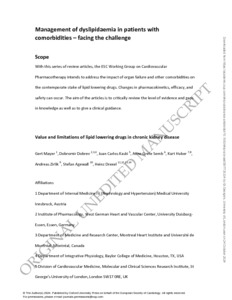Mayer, G; Dobrev, D; Kaski, JC; Semb, AG; Huber, K; Zirlik, A; Agewall, S; Drexel, H
(2024)
Management of dyslipidaemia in patients with comorbidities-facing the challenge.
Eur Heart J Cardiovasc Pharmacother, 10 (7).
pp. 608-613.
ISSN 2055-6845
https://doi.org/10.1093/ehjcvp/pvae058
SGUL Authors: Kaski, Juan Carlos
![[img]](https://openaccess.sgul.ac.uk/116894/1.hassmallThumbnailVersion/pvae058.pdf)  Preview |
|
PDF
Accepted Version
Available under License ["licenses_description_publisher" not defined].
Download (1MB)
| Preview
|
Abstract
Dyslipidaemia is a common chronic kidney disease (CKD) and contributes to excessively elevated cardiovascular mortality. The pathophysiology is complex and modified by comorbidities like the presence/absence of proteinuria, diabetes mellitus or drug treatment. This paper provides an overview of currently available treatment options. We focused on individuals with CKD and excluded those on renal replacement therapy (haemodialysis, peritoneal dialysis, or kidney transplantation). The use of statins is safe and recommended in most patients, but guidelines vary with respect to low-density lipoprotein (LDL) cholesterol goals. While no dedicated primary or secondary prevention studies are available for pro-protein convertase subtilisin/kexin type 9 inhibitors, secondary analyses of large outcome trials reveal no effect modification on endpoints by the presence of CKD. Similar data have been shown for bempedoic acid, but no definite conclusion can be drawn with respect to efficacy and safety. No outcome trials are available for inclisiran while the cholesterol lowering effects seem to be unaffected by CKD. Finally, the value of fibrates and icosapent ethyl in CKD is unclear. Lipid abnormalities contribute to the massive cardiovascular disease burden in CKD. Lowering of LDL cholesterol with statins (and most likely PCSK9 inhibitors) reduces the event rate and thus statin therapy should be initiated in almost all individuals. Other interventions (bempedoic acid, inclisiran, fibrates, or icosapent ethyl) currently need a case-by-case decision before prescription.
| Item Type: |
Article
|
| Additional Information: |
This is a pre-copyedited, author-produced version of an article accepted for publication in European Heart Journal Cardiovascular Pharmacotherapy following peer review. The version of record Gert Mayer, Dobromir Dobrev, Juan Carlos Kaski, Anne Grete Semb, Kurt Huber, Andreas Zirlik, Stefan Agewall, Heinz Drexel, Management of dyslipidaemia in patients with comorbidities—facing the challenge, European Heart Journal - Cardiovascular Pharmacotherapy, 2024;, pvae058 is available online at: https://doi.org/10.1093/ehjcvp/pvae058. |
| Keywords: |
1102 Cardiorespiratory Medicine and Haematology, 1115 Pharmacology and Pharmaceutical Sciences |
| Journal or Publication Title: |
Eur Heart J Cardiovasc Pharmacother |
| ISSN: |
2055-6845 |
| Language: |
eng |
| Publisher License: |
Publisher's own licence |
| PubMed ID: |
39153964 |
| Dates: |
| Date |
Event |
| 2024-11-05 |
Published |
| 2024-08-17 |
Published Online |
| 2024-08-16 |
Accepted |
|
 |
Go to PubMed abstract |
| URI: |
https://openaccess.sgul.ac.uk/id/eprint/116894 |
| Publisher's version: |
https://doi.org/10.1093/ehjcvp/pvae058 |
Statistics
Item downloaded times since 24 Oct 2024.
Actions (login required)
 |
Edit Item |



